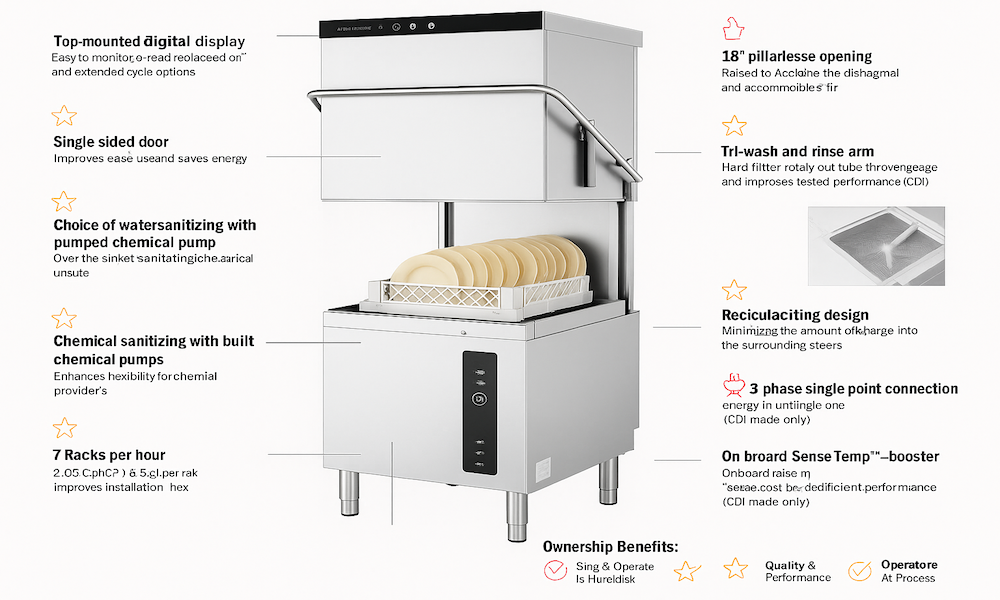
Pour laver efficacement de grandes quantités de vaisselle, les lave-vaisselle professionnels se distinguent par leur rapidité, leur robustesse et leur pouvoir désinfectant. Que vous gériez un restaurant très fréquenté ou que vous soyez simplement lassé d'attendre une heure que votre lave-vaisselle domestique termine son cycle, comprendre le fonctionnement de ces machines et leurs exigences vous aidera à déterminer si elles vous conviennent.
1. Les lave-vaisselle commerciaux utilisent-ils du détergent ?
Oui. Comme les lave-vaisselle domestiques, les modèles professionnels utilisent du détergent et des agents de rinçage pour dissoudre la graisse et désinfecter la vaisselle. Cependant, le détergent utilisé dans les lave-vaisselle professionnels est beaucoup plus puissant et conçu pour les cycles de lavage à haute température. Il contient des tensioactifs puissants qui permettent d'éliminer rapidement les résidus alimentaires en seulement 60 à 90 secondes.
Se procurer ces produits chimiques industriels en petites quantités peut s'avérer difficile pour un usage domestique, car les restaurants effectuent généralement des centaines de cycles de lavage par jour. Comme l'a souligné un utilisateur : « Notre machine au travail effectue entre 150 et 200 cycles par poste de huit heures. À la maison, la même machine n'en effectue qu'un ou deux par jour ; un seul flacon de produit chimique peut donc durer toute une année. »

2. Un lave-vaisselle commercial a-t-il besoin d'un bac à graisse ?
Dans la plupart des restaurants, oui. Les bacs à graisse sont indispensables pour éviter que les graisses et les huiles n'obstruent les canalisations. Bien que le lave-vaisselle lui-même ne produise pas de graisse, les déchets provenant de la vaisselle prérincée contiennent souvent des résidus alimentaires et de l'huile. L'installation d'un bac à graisse garantit la conformité aux normes de plomberie locales et le bon fonctionnement du système d'évacuation des eaux usées.
Pour les installations domestiques, un bac à graisse n'est généralement pas nécessaire, sauf si la machine est raccordée à une conduite qui traite fréquemment des eaux de vaisselle grasses.
3. Un lave-vaisselle commercial doit-il être protégé par un disjoncteur différentiel (GFCI) ?
Les lave-vaisselle professionnels, fonctionnant avec des connexions électriques à haute tension et exposés à l'eau, doivent impérativement être protégés par un disjoncteur différentiel (DDR) pour garantir la sécurité. De nombreux règlements de construction locaux l'exigent pour les cuisines professionnelles. Si vous envisagez d'en installer un chez vous, consultez un électricien qualifié afin de vous assurer que votre installation électrique est conforme à ces exigences.
4. Comment fonctionnent les lave-vaisselle commerciaux ?

Les lave-vaisselle professionnels sont conçus pour la rapidité et la régularité . Contrairement aux lave-vaisselle domestiques, qui fonctionnent pendant plus d'une heure avec des variations de température progressives, les modèles professionnels effectuent un cycle complet en seulement 90 secondes .
Voici comment :
-
Puissance et chaleur : Elles maintiennent le réservoir de décantation à des températures supérieures à 65 °C , garantissant ainsi que l'eau chaude et les détergents puissent éliminer rapidement la graisse et les bactéries.
-
Rinçage et désinfection : Un système de rinçage à l’eau chaude indépendant maintient l’eau à plus de 82 °C pour une désinfection optimale. Par exemple, le modèle Hobart avec système de désinfection à l’eau chaude consomme énormément d’énergie, comme une cuisinière, et nécessite un raccordement électrique dédié ; en revanche, il garantit une hygiène parfaite.
-
Efficacité : Malgré une consommation d'énergie plus élevée, les lave-vaisselle commerciaux utilisent souvent moins d'eau par cycle que les modèles domestiques en raison de leurs temps de fonctionnement courts et de la recirculation continue d'eau chaude.
5. Comparaison de la consommation d'énergie et d'eau
Les lave-vaisselle domestiques consomment généralement environ 50 W pendant la majeure partie du cycle, chauffant progressivement l'eau lors des phases de prérinçage, de lavage et de séchage. En revanche, les appareils professionnels chauffent l'eau instantanément et maintiennent une température élevée tout au long du cycle.
Bien que cela puisse paraître énergivore, la consommation totale peut être similaire, voire inférieure, puisque le cycle est très court.
6. Quels sont les avantages d'utiliser un lave-vaisselle commercial à la maison ?

Bien que conçus pour les restaurants, certains particuliers choisissent d'installer un lave-vaisselle de bar ou un lave-vaisselle compact Hobart à domicile pour les raisons suivantes :
-
Rapidité : Nettoie la vaisselle en moins de deux minutes.
-
Assainissement : Utilise des cycles de rinçage à haute température qui tuent instantanément les bactéries.
-
Durabilité : Conçu pour supporter des centaines de cycles par jour grâce à sa construction en acier inoxydable.
-
Longévité : Conçue pour des années d'utilisation intensive, elle surpasse largement les modèles grand public.
Il est toutefois important de noter que l'installation peut s'avérer complexe. Néanmoins, pour les familles nombreuses ou les passionnés de cuisine, cet investissement peut se justifier par le confort et les performances qu'il offre.
Conclusion : Un lave-vaisselle professionnel est-il un bon investissement ?
Si votre cuisine traite un grand nombre de vaisselle chaque jour, un lave-vaisselle professionnel peut transformer votre quotidien. Il lave plus vite, désinfecte mieux et dure plus longtemps que les modèles domestiques classiques. Assurez-vous simplement que votre installation de plomberie, votre système électrique et votre approvisionnement en détergent soient compatibles.

Que vous recherchiez un lave-vaisselle Hobart , un lave-vaisselle de bar ou d'autres solutions de lavage de vaisselle de qualité commerciale, Chefco propose une large gamme de lave-vaisselle commerciaux de marques de confiance comme Hobart et Sub-Equip .


